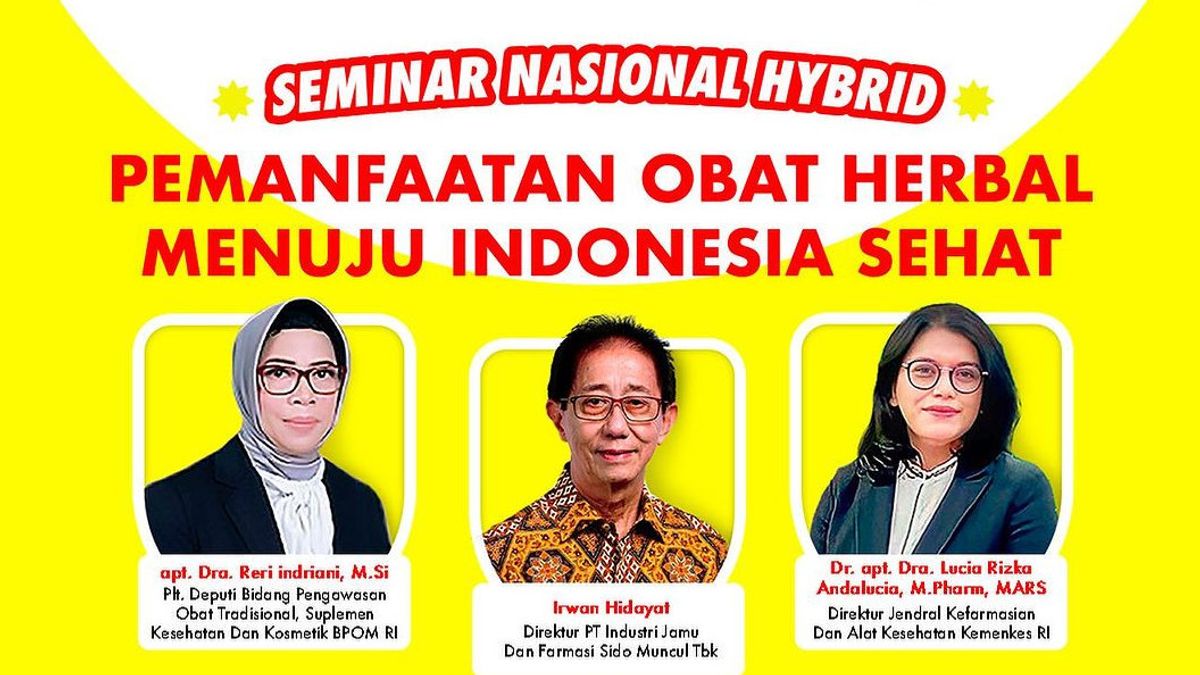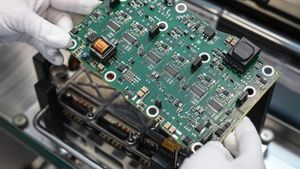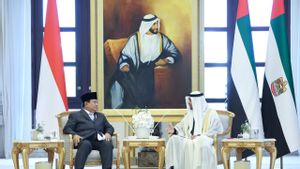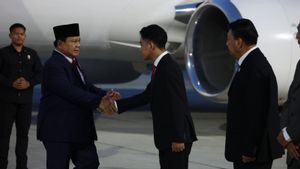JAKARTA - PT Industri Jamu and Pharmacy Sido Muncul Tbk (SIDO) through its superior product Tolak Angin in collaboration with the Faculty of Medicine, Sriwijaya University (Unsri) held a hybrid seminar entitled "Utilizing Herbal Medicine Towards a Healthy Indonesia". In the seminar held at the Azwar Agoes Hall of the Faculty of Medicine FK Unsri on Thursday 31 August, Sido Muncul seeks to encourage the use of herbal medicine and its development and utilization for public health.
The development of science and technology in the field of herbal medicines or known as herbal medicines needs to continue to be carried out by various stakeholders, ranging from the government, academics, the business world and the community to support health services and the independence of national medicinal raw materials.
As one of the countries with high biodiversity, Indonesia does not lack plant species and herbal medicinal plants. Unfortunately not all are used for treatment.
Director of Sido Muncul Irwan Hidayat said the seminar held in Palembang was the 49th initiated by Sido Muncul since 2007. With this seminar, it can encourage medical academics to continue to research scientific medicinal plants.
"Development of science and technology in the field of herbal medicine or herbs needs to continue to be carried out by the government, academics, the business world, and the community, namely with herbal science, in this case it is based on research, and health services," said Irwan, quoted on Saturday, September 2.
In addition, Irwan wants this seminar to open the eyes of the medical world as well as insights into the herbal medicine industry, and research that has been carried out by Sido Muncul for public health services.
"Everything we do with research on developing products, and using herbal medicine for health services," said Irwan.
According to him, Indonesia is a country rich in medicinal and herbal plants, but still cannot host in its own country, many have not been acquired.
Irwan hopes that medical academics are encouraged to continue to research scientific medicinal plants. It does not only depend on modern chemical-based drugs. In addition, the medical world has gained insight into the herbal medicine industry, research conducted to develop products, and use herbal medicine for health services.
Irwan added that the initial problem of the lack of use of herbal medicine is the lack of medical knowledge of plant types. In fact, if understood more deeply, herbal plants can help a patient recover from the disease.
"There is no research on natural ingredients, if one doctor understands herbal medicine, it is clear that the use of herbs will be more used," he said.
The seminar, which was attended by around 300 participants, consisted of medicine, pharmacists, and health workers by presenting six sources, which were divided into two sessions.
In the first session featured apt Dra Reri Indriani MSi, Acting Deputy for Supervision of Traditional Medicines for Health Supplements and Cosmetics of BPOM RI which raised the theme regarding Indonesia's Traditional Medicines Supervision Policy in supporting the Healthy Indonesia Program, Dr Apt Dra Agusdini Banun Saptaningsih MARS.
Meanwhile, in the second session, it featured Dr. Noor Wijayahadi Mkes PhD, Faculty of Medicine, Unversity Diponegoro (Undip) Semarang regarding the Beneficiary Test of Tolak Angin, Dr. Apt. Ipang Djunarko SSi MSc.
Researcher from the Faculty of Pharmacy, Sanata University, Dharma Yogyakarta, regarding the Toxisity Test of Tolak Angin Subchronis, and Dr. Dr. Dr. Mgs Irsan Saleh M Biomed Deputy Dean II of the Faculty of Medicine, Sriwijaya University, Palembang raised a theme about Drug Discovery Utilization of Indonesian Indigenous Plants. Keramuning as a Candidate for Mellitus Diabetes.
Irwan said that like the Tolak Angin product, Sido Muncul has conducted various studies, namely the Toxisity Test and the Typical Test, the results of drinking Tolak Angin in the long term do not cause side effects if taken according to the recommended dose (does not cause a toxic effect on the body's organs).
The Vice Chancellor of Sriwijaya University (UNSRI) Prof. Dr. Ir M Said MSc said that his party strongly supports the method of treatment using herbs to Towards a Healthy Indonesia 2045. According to him, treatment with herbal plants is more appropriate than chemicals.
However, in the process it is very necessary to provide assistance from the industrial world and health practitioners so that existing medicinal and herbal plants can become standardized and useful products.
Said added that currently the public's interest in the use of herbal medicines is very large because it has many benefits. His party is very excited to conduct research on medicinal and herbal plants, which are of a lot of types and have not been explored.
"We continue to research together on medicinal plants such as collaborating with Sido Muncul and other parties because there are still many plants that have not been well explored even though there are many benefits. The point is that we are very supportive of the holding of this seminar and hopefully we can continue to work with Sido Muncul," he said.
With the results of this study, Unsri will work with Sido Muncul to encourage the cultivation of herbal medicinal plants in the community. Moreover, the Indralaya (Unsri) campus covers an area of 740 hectares, there are five reservoirs.
"The land is still available, it can be used for medicinal plants. Later, the MOU will be poured from upstream to downstream so that it can be further cultivated," he said.
The English, Chinese, Japanese, Arabic, and French versions are automatically generated by the AI. So there may still be inaccuracies in translating, please always see Indonesian as our main language. (system supported by DigitalSiber.id)













